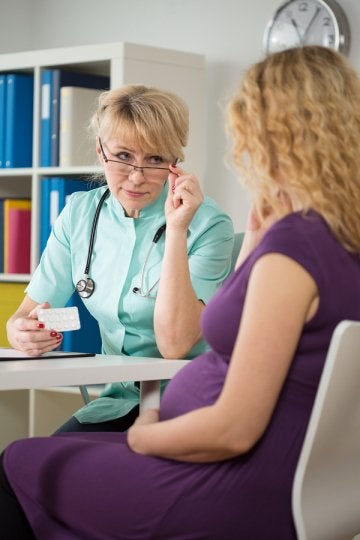-
Why Most Women Need a Pap Test
A Pap test—also called a Pap smear—is a simple test that can be performed by your gynecologist in seconds and that could save your life. Most women between the ages of 21 and 65 should have regular Pap tests on a schedule determined by their gynecologist.

Pap tests are so important to women’s health because they are the only way to diagnose cervical cancer in its early stages. During a Pap test, your gynecologist will take a swab of cervical tissue that is then screened for abnormal cells. With these results, not only can your gynecologist diagnose cancer in its most treatable stages, but he or she can also locate pre-cancerous cells so they can be treated before they become cancer. Because cervical cancer seldom causes symptoms until it progresses, a Pap test is the only way to find the disease early.
Are you due for a Pap smear in Washington, DC ? Schedule an appointment at Washington Surgi-Clinic to find out. Call (202) 659-9403 to make an appointment with a gynecologist for your Pap test and to get answers to your questions about birth control methods, STD testing, and more.
-
Answers to Your Questions About Pap Tests
A Pap test, also known as a Pap smear , is an important health screening for women. A gynecologist can perform Pap smears to check for the presence of abnormal cells in the cervix, which is the lowest part of the uterus. These abnormal cells may later become cancerous unless treated.

Do I Really Need a Pap Test?
The early stages of cervical cancer may not necessarily cause symptoms. However, detecting cancer or identifying pre-cancerous changes as early as possible is crucial for a favorable outcome. By having regularly scheduled Pap tests, you can boost your chances of detecting this deadly disease as early as possible. However, some women may not need to have Pap tests any longer. These include women who have undergone a hysterectomy to remove the cervix and uterus, provided they do not have a history of abnormal Pap smears or cervical cancer. A gynecologist may also inform a woman that she no longer needs Pap smears if she is 65 years or older, has had three normal and consecutive Pap tests, and has not had any abnormal results within the past decade.
How Often Should I Have a Pap Smear?
Your gynecologist can let you know how often you should have a Pap smear. Most women who are between 21 and 29 years old should receive a Pap test every three years. Women between 30 and 64 may have a Pap test every three years by itself or they can have a Pap test and HPV test together every five years.
Are There Any Scheduling Considerations?
Try to schedule your Pap test 10 to 20 days after you first begin your period. If your period is irregular and you begin bleeding close to your appointment date, you can reschedule your appointment with the gynecologist. To facilitate accurate test results, refrain from certain activities for two days prior to your appointment. These activities are using tampons, douching, having sex, using vaginal suppositories or creams, and using vaginal deodorant products.
Washington Surgi-Clinic continues its mission of providing safe, compassionate, and confidential women’s wellness services since our founding in 1973. Women can have a Pap smear in Washington, D.C. by appointment at our gynecology clinic. Call (202) 659-9403 or visit our website to read about our other gynecology services, including morning after pills and HPV treatment.
-
When to Get a Routine Pap
Cervical cancer is often a preventable disease. Your gynecologist can perform a Pap test, which checks your cervix for abnormal cellular changes that may lead to cervical cancer. This allows your gynecologist to recommend early treatment before the abnormality becomes cancerous. Even if you are not sexually active, your gynecologist is likely to recommend that you get a Pap test if you are between the ages of 21 and 65. Your doctor can also provide recommendations on how often to get a Pap smear. Some women might have this test every year, while others might only have it every three years.

Certain women may no longer need a Pap test. Your gynecologist might inform you that you do not need this test if you underwent a hysterectomy for reasons other than reproductive cancer and your cervix was removed. Women who are 65 or older who have not had abnormal test results in the past 10 years may no longer need to have this test.
Washington Surgi-Clinic, a center for gynecology in Washington, D.C., provides a full range of well-woman healthcare services , including Pap smears. Call us at (202) 659-9403 or visit us online to read about our commitment to patient confidentiality.
-
What to Expect from a Pap Test
If you’ve scheduled your first Pap smear at a gynecologist’s office, you’re taking an important step toward safeguarding your health. Pap tests allow your gynecologist to check for abnormal changes of the cervix, some of which may lead to cervical cancer. It’s perfectly normal to experience a little anxiety about having a Pap smear. However, staying relaxed and easing muscle tension in your lower body can make the test proceed more quickly.

Preparing for Your Appointment
When you call the gynecology office to schedule the Pap test, be sure to choose a date on which you do not expect to have your period. It’s generally best to schedule the test 10 to 20 days after the first day of your period. During the two days prior to your appointment, you should avoid certain things that may interfere with the results of your test. This includes using tampons, vaginal deodorant sprays or powders, vaginal creams, and vaginal suppositories. You should also avoid douching and having sex.
Undergoing the Exam
At the gynecology office, you’ll have privacy while you disrobe and put on a hospital gown. Then, you’ll sit on the edge of the exam table, place your feet in the stirrups, and lie back on the table. You’ll be asked to separate your legs and to relax your muscles. Some women may experience some minor discomfort during the exam. It can be helpful to take deep, steady breaths. Your gynecologist will examine your external genitalia before gently inserting a speculum. This device widens the opening so that the gynecologist can examine the cervix and vaginal walls. Then, the gynecologist uses other medical tools to collect a sample of cervical cells. After the provider collects the sample and removes the medical devices, he or she performs a manual internal examination. The gynecologist inserts two fingers into the vagina and places the other hand on your abdomen. This allows your gynecologist to check for any abnormalities in the pelvic region.
If you have any questions about your upcoming appointment at Washington Surgi-Clinic , you can call us at (202) 659-9403. Our state-of-the-art medical facility provides an unparalleled level of professional and courteous personal care for women. In addition to annual Pap tests and pelvic exams, our gynecology team provides STD testing, morning after pills, and pregnancy termination near Washington, D.C.
-
Why Pap Smears Are Important
Part of taking good care of yourself involves scheduling regular wellness exams and preventive screenings, including pelvic exams and Pap smears. During a Pap test, the gynecologist takes a small sample of cells from the cervix. A laboratory tests the sample for abnormalities that may be indicative of precancerous conditions. In other words, having a Pap test can let you know if you may be at risk of cervical cancer before the cancer develops.

It’s important to visit your gynecologist for regular Pap smears because it is possible to have a false negative result. By having a Pap smear on a regular basis, you increase the chances that your gynecologist will detect any precancerous changes. General guidelines recommend that all women have a Pap test no later than their 21 st birthday or within three years of first having sexual intercourse, if that date is earlier than the 21 st birthday. Since these are general guidelines, it’s advisable to ask your gynecologist when you should start having Pap tests and how often you should have them.
Washington Surgi-Clinic has been providing compassionate, confidential gynecology services near Washington, D.C. since 1973. To schedule an appointment for a Pap test, STD treatment, or pregnancy termination, call us at (202) 659-9403.
Recent Posts
Popular Posts
categories
- Uncategorized
- STD
- Washington Surgi-Clinic
- Abortion
- Pregnancy
- Pap Smears
- Birth Control Options
- HPV
- Gynecologist
- Pregnancy Test
- Abortion Safety
- IUD
- Pregnancy Termination
- First Trimister
- Cervical Cancer
- Morning After Pill
- Birth Control Pills
- Chlamydia
- Birth Control Shot
- Gonorrhea
- STD Testing
- Birth Control Implant
- Pelvic Pain
- Birth Control Patch
- HIV
- HPV Vaccine
